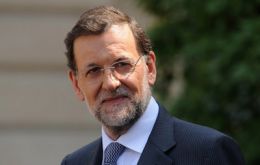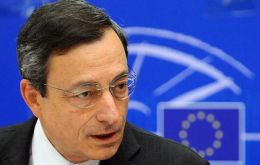MercoPress. South Atlantic News Agency
Tag: European Central Bank
-
Saturday, March 9th 2013 - 04:16 UTC
ECB calls on governments to promote growth and combat the tragedy of unemployment

European Central Bank President Mario Draghi urged indebted governments to move beyond spending cuts and tax hikes and introduce reforms that would boost growth and reduce the “tragedy” of unemployment.
-
Friday, January 11th 2013 - 08:32 UTC
An optimistic Dragui sees a “positive contagion” in the Euro zone economy

European Central Bank (ECB) president Mario Draghi spoke on Thursday of a “positive contagion” in the Euro zone economy, saying that the financial situation is improving and growth is set to return in the second half of the year.
-
Wednesday, January 2nd 2013 - 23:53 UTC
Money timidly returning to Spain after 14 months of sustained outflows

Foreign investors put more money into Spain in October than they took out, marking the second month running the country has benefited from an influx of capital. Spain registered capital inflow of 12.1 billion Euros in October, the Bank of Spain said on Friday. The figure, which excludes central bank operations, was lower than the 31 billion Euros of inflow in September.
-
Friday, December 14th 2012 - 07:16 UTC
EU reaches landmark deal to make the ECB the top banking supervisor

The European Union reached a landmark deal on Thursday to make the European Central Bank the bloc's top banking supervisor, giving EU leaders greater confidence that they are gaining the upper hand over the Euro zone's debt crisis.
-
Monday, December 10th 2012 - 18:48 UTC
European Central Bank says it has ‘much to learn’ from Latam robust financial systems

The Vice-president of the European central bank Vitor Constancio said the EU has much to learn from Latin America which has coped with successive economic and financial crises and has managed to create robust financial structures which have made the region’s system even more resistant to outside shocks.
-
Saturday, December 1st 2012 - 07:00 UTC
Moody’s downgrades EU financial support funds after France loses top grade

Moody's Ratings agency announced it has downgraded the European Stability Mechanism (ESM) and European Financial Stability Facility (EFSF) from “Aaa” to “Aa1,” with negative outlook on each.
-
Wednesday, August 29th 2012 - 02:22 UTC
Spain to the mercy of markets and with little signs of recovery

Spain’s recession worsened in the second quarter as the government’s austerity push to reduce the Euro area’s third-biggest budget deficit and a slump in consumer spending offset growth in exports.
-
Friday, August 3rd 2012 - 08:01 UTC
ECB disappoints but keeps markets’ expectations of bold actions alive

Asian shares and the Euro eased on Friday as the European Central Bank, as happened with the Federal Reserve on Wednesday, disappointed markets looking for an imminent move to deal with the Euro zone debt crisis.
-
Thursday, July 26th 2012 - 19:51 UTC
ECB to the rescue of Spain and Italy and avoid collapse of Euro zone

European Central Bank President Mario Draghi pledged on Thursday to do whatever was necessary to protect the Euro zone from collapse, including acting to lower unreasonably high government borrowing costs.
-
Monday, July 23rd 2012 - 09:20 UTC
ECB chief says “Euro is irreversible”; praises will to create supranational bodies

European Central Bank President Mario Draghi said that the Euro was not in danger despite some analysts' worse case scenarios for a break-up and said that greater financial, budgetary and political union among Euro zone countries was inevitable.
